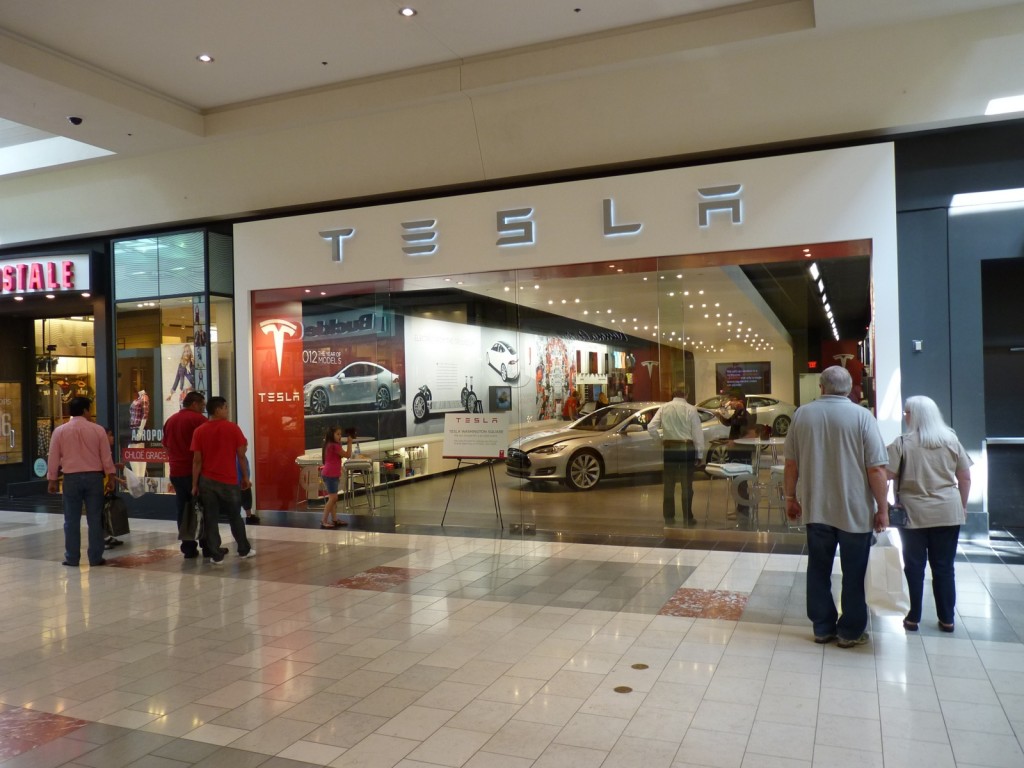Win some, lose some.
Tesla's had a very good year thus far, but it was recently dealt legislative defeats in two states where it had hoped to sell its electric cars.
In Texas, the state legislature declined to make an exception to existing rules that make it illegal for automakers to sell cars to retail buyers.
In North Carolina, a Senate committee unanimously approved a bill making it illegal to sell new cars over the Internet.
The resulting laws require that all new-car sales be transacted through independently owned third-party businesses in the state.
In other words: car dealers.
Existing franchisees protected
These laws have been on the books for decades, and were originally intended to protect existing franchised dealers from predatory competition by factory-owned stores that might have gotten more favorable terms from the automakers who owned them.
While the specifics vary from state to state, a majority of the 50 states have some version of laws saying that carmakers may not compete with their franchised dealers.
Which was fine, until Tesla Motors [NSDQ:TSLA] showed up. The Silicon Valley startup maker of electric cars has no franchised dealers, so it argues that laws to protect them are not relevant.
CEO Elon Musk argues that existing auto dealers--who make all their money selling cars with combustion engines--have no business incentive to sell battery-electric cars.
'Perversion of democracy'
That's not an easy fight, however.
At Tesla's annual shareholder meeting on Tuesday, Musk said, "The automobile association is definitely creating some problems for us, making it harder to get things done."
He admits that auto dealers approach Tesla about becoming franchised dealers, but that the company simply doesn't believe that can work for a disruptive startup carmaker.
Why, he asks, would any of those businesses have the fervor needed to convert new buyers to electric cars and take business away from gasoline cars?
Tesla owners & supporters gather in Statehouse in Austin to support company [photo: John Griswell]![Tesla owners & supporters gather in Statehouse in Austin to support company [photo: John Griswell] Tesla owners & supporters gather in Statehouse in Austin to support company [photo: John Griswell]](https://images.hgmsites.net/lrg/tesla-owners-supporters-gather-in-statehouse-in-austin-to-support-company-photo-john-griswell_100424741_l.jpg)
"In the last 90 years, when did it work?" Musk asked. "There are no good examples."
Musk cited survey results showing 86 to 99 percent of respondents approving of Tesla's direct-sales model, often likened to buyers purchasing iPads and iPods directly from Apple.
"If democracy is working and legislators are implementing the will of the people," Musk said forcefully, "there wouldn't be legislation trying to restrict direct sales."
He called efforts to ban Tesla's sales model a "perversion of democracy."
No action on Texas exemption
State auto-dealer associations view Tesla's direct sales as a dire threat, and many of them have worked to close the loophole Tesla represents by making it illegal for automakers to sell to retail buyers under any circumstances.
In Texas, a pair of bills that would have exempted startup makers of all-electric cars--in other words, Tesla Motors--from the state's existing ban failed to move forward in the legislative session.
Musk had testified at hearings on the bill in the state capitol in Austin; Tesla owners and supporters rallied outside the building and in front of a row of privately-owned Model S luxury sport sedans.
That means Tesla supporters won't have another chance at making its direct sales legal until 2015; the Texas legislature only meets every other year.

Tesla Store - Portland OR
Until then, any Texas resident who wants to buy a Tesla Model S must do so in another state.
In North Carolina, a bill that would make it illegal for a carmaker to sell a car over the Internet was unanimously approved by the state Senate's Commerce Committee.
That bill could even make it illegal for that maker to respond to e-mail inquiries--though its language remains to be tested in court.
Stopping Tesla protects you, dealers say
For an explanation of why state dealer associations feel making Tesla's sales process illegal is the best way to protect car buyers, see comments by Tim Jackson of the Colorado Auto Dealer Association here.
His group was able to make Tesla Stores illegal in Colorado early in 2010 after just a single outlet had opened there. Tesla still has just one retail location in his state.
![Tesla owners & supporters gather in Statehouse in Austin to support company [photo: John Griswell] Tesla owners & supporters gather in Statehouse in Austin to support company [photo: John Griswell]](https://images.hgmsites.net/lrg/tesla-owners-supporters-gather-in-statehouse-in-austin-to-support-company-photo-john-griswell_100424743_l.jpg)
Tesla owners & supporters gather in Statehouse in Austin to support company [photo: John Griswell]
It was also defeated legislatively in Virginia. On the other hand, Tesla has won court victories in Massachusetts, Minnesota, and New York.
These battles will most likely to continue over the next several years.
Large donations, political power
Auto dealers and their state associations are both visible presences in their local communities and major donors to politicians who will enact legislation that benefits their businesses.
And the National Auto Dealers Association (NADA) has alluded to its monitoring of Tesla's expansion--and its large staff of attorneys.
So we expect there will be more stories written about auto dealers fighting Tesla over the next few years.
To grow its business and reach more U.S. buyers, the company must open more stores and expand sales beyond its current, largely coastal markets.
Tesla buyers and supporters in those (largely red states) will probably have a lot on their plate in years to come.
For the record, these laws are a uniquely American phenomenon: They simply don't exist in Europe.
_______________________________________________













